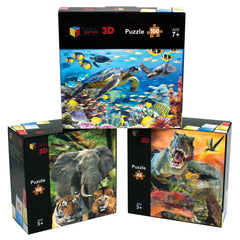Want Smarter Kids? Puzzles Might be the Answer!
While playing with puzzles won't guarantee your child will become a Mensa member, there is some evidence that they could help make them better thinkers. The brain is like any other muscle; it needs exercise to perform at its best. Puzzles are one way to give kids’ minds a workout. And best of all, they’re fun too! Research has shown that daily puzzle-solving will sharpen thinking in both adults and children. But there’s a catch: once you stop playing, the benefits erode. It’s a benefit that people who do crosswords every day might be getting. And for people who like jigsaw puzzles, a good one can occupy them for days, weeks, even months. Since young children, unlike adults, are not occupied each day with a job that requires thinking, one could argue that it’s even more important that they have some ‘brain-training’ on a daily basis. Verbal, logic, memory, and reasoning are all considered to be cognitive skills. That’s where puzzles that involve reasoning, memory, or logical thinking might actually make us smarter. Let’s go back to jigsaw puzzles. First off, they’re hardly new - they’ve been around for centuries and are still very popular. They are truly timeless. But how can a jigsaw puzzle help the brain? We have two sides to our brains: the left side being the more analytical; the right side being more creative. We’ve all heard it said that to find solutions to problems we need to use both sides of our brains. That’s where jigsaw and other types of puzzles come in - they require both analytical and creative thinking to get to the solution. Encouraging children to concentrate on one thing at a time is important. As adults, we know that sometimes we have no choice but to multitask if we’re going to get through the day. But research has shown that our brains work best when they’re focused on one task at a time. Overloading the neurons might not be the best way to solve a problem, whether it’s technical, analytical, or personal in nature. Henry Ford is known for saying, “Thinking is the hardest work there is, which is probably the reason why so few engage in it.” So why not get your kids to turn off their screens, gather around the kitchen table, and play a great puzzle game? It’s fun and bound to be great brain-training for the whole family. Why not hold a weekly ‘puzzle night’? Now back to that tricky jigsaw puzzle I was working on...











